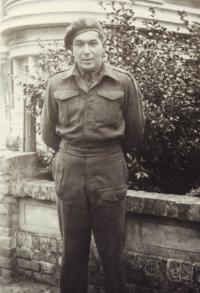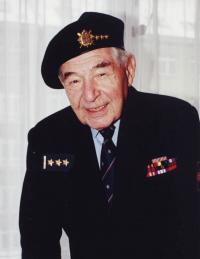“But it was an experience to me that they played the song ‘Škoda lásky’ for us in Liverpool. And it was beautiful. And then they translated it into English.”
Evžen Slezák was born on September 24th, 1918. After the occupation of the rest of the Protectorate he fled to Bratislava on July 1st, 1939. On the Danube he got to Palestine through Hungary, Yugoslavia, Romania and Bulgaria. He lived there from 1940 to 1943. He joined the army in 1942. He was supposed to guide the airport with archies Bofors. He left for England through Madagascar, South African Republic and Sierra Leone in 1943. He got to the fights in France from there. He took part in the Battle of Dunkirk in 1944. He returned to Czechoslovakia after the end of the war. He was promoted to the military rank of colonel in 1996.


